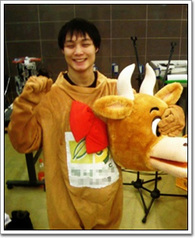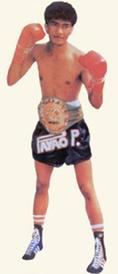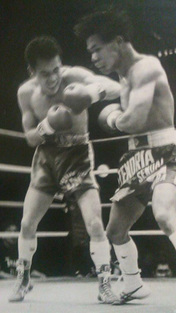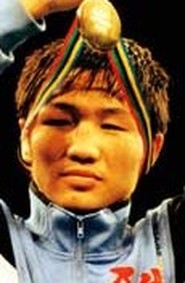 The history of boxing is littered with bizarre stories. They range from moments of madness, like Mike Tyson threatening to Lennox Lewis' children, to Trenton Titsworth kissing a young Jessie Vargas, from the “Fan Man” fight to Andrew Golota inciting a riot in New York. A little known streak of the unusual came from Korean fighter Young Ik Hwang, a fighter that very few outside of Korea will know of, and many in Korea will know of for the fact he received a lot of media attention in 2009. That attention focused on what seemed to be a break down, though lead some in the media to mock him for being a “third rate boxer”. Born in Seoul in 1988 Hwang turned to boxing as a teenager and debuted a month before his 19th birthday. He dropped out of college to pursue his boxing dreams and pretty much put everything into being a success in the ring. Sadly for Hwang his boxing career turned out to be a giant flop with the fighter running up a career record of 0-6 in a career that lasted just 18 months. Not only did he fail to score a single win be he was also losing to limited opposition, with his most notable bout being a shut out loss to Jin Ki Jung in his final bout. Whilst boxing the youngster worked a variety of jobs, including work in a warehouse, in telemarketing and in various outfits to try and promote various things on the street, such as things related to Disney and a type of beef based food. Following his unsuccessful career as a boxer Hwang turned his attention to fighting for his country and enlisted in the Korean armed forces. And then seemed to have a mental break down. After spending time with the armed forces Hwang took to Myspace and wrote several ranting messages in 2009, including the details of 5 individuals that he intended to kill. Giving various personal details of those 5 people and posting nude pictures of himself on the social media site. In fact he also masturbated in front of a security camera as his behaviour became incredibly erratic. More worryingly however was the fact he stabbed his ex girlfriend, who thankfully fled the scene before Hwang could do more harm. As well as the threatening messages there was also a message stating that Hwang had a huge monster living inside him. The Korean netizen described Hwang's actions as being those of a “lunatic” and of someone who was “mad”. Unsurprisingly he was taken to a military hospital and diagnosed with personality disorders and received treatment before being arrested by the local police force. Sadly news on Hwang's situation since his arrest in 2009 has been hard to find though we genuinely do wish that he's now over-come the monsters and darkness that seemed to take over his life.
0 Comments
As a sport boxing has given us some tremendous stories. The story of Manny Pacquiao, for example, rising from a boy who was unable to eat a proper meal to becoming a sporting mega star is one of the best. Likewise the massive turn around in the life of Amnat Ruenroeng and Bernard Hopkins, who both used boxing as their way out of crime and prison, are equally as wonderful and inspiring as anything else out there.
Sadly though for all the great stories the sport has also given us some horrific ones. Stories like James Butler, who murdered Sam Kellerman and assaulted Richard Grant in one of the most sickening scenes ever seen in a boxing ring. Another harrowing story of a boxer turned bad is that of the scarcely remembered Akio Konishi, who is currently serving a prison sentence in Japan for killing his own father. Konishi, from Gifu, broke on to the professional boxing scene in the early 00's, debuting in July 2002. His career quickly got attention in Gifu due to his exciting and heavy handed style that helped him create a genuine buzz in the local region. By the end of 2006 he had amassed an impressive record of 20-0 (17) and was beginning to move towards a Japanese title fight despite only being 22. In fact he was ranked #2 by the JBC at Bantamweight and really on the verge of becoming a break out boxing star. Sadly for Konishi his career would be curtailed in 2007 after suffering a detached retina in a bout against Alex Escaner. Not only was Konishi forcibly retired by the injury but he also suffered his first loss, being stopped in 2 rounds by the 32 year old Escaner. With his career over the young Konishi seemed to face away completely from the limelight and attention. That was until December 2014 when his name was all over the Japanese press, and not in a good way. The news had reported that the then unemployed Konishi had been been arrested in connection with the death of his father, Yasuhide Konishi, The 60 year old Mr Konishi had been literally beaten to death by his son in the house they shared, along with Akio's mother who was at work of the time of the assault. When questioned by the police Akio had claimed that his father had abused him during a quarrel and that had lead to the younger of the two men hitting his father, repeatedly, until the elder man was unconscious. After more than 2 hours of Yasuhide being unconscious a call was made to 119, the Japanese number for the emergency medical service, who arrived at the scene but were unable to revive Yasuhide. Following the medical service arriving they quickly informed the police who investigated the incident, and quickly arrested Akio. In September 2015 Akio was sentenced to prison after being found guilty of causing injuries that lead to the death of his father, who had died died from heart disease. The official cause of death likely saved Akio from being sentenced for murder, though the court ruled that the actions of Akio had lead to his father's death. Akio had argued that he had never intended to kill his father but the judge rejected claims that Akio's had not intended to “inflict serious injury”, given the amount of times Yasuhide had been hit and given Akio's former profession. Friends and family had stated that Akio wasn't usually a violent person but that prior to the incident he had shown some issues and had struggled to get a job following his boxing career. It would seem like the loss of his dreams of boxing for a career lead to a downward spiral that resulted in arguments with his father, likely about his job status, and eventually his father's death. Konishi will be in prison until 2021 and we hope, when he's released, that he'll find some purpose in life. Sadly though it seems unlikely given how things have been since his forced retirement. Sadly knowing what he has done there is a chance that Konishi will never manage to return from the darkness and will manage to integrate properly into society The hardest thing to see as a boxing fan isn't our favourite losing, nor is it a robbery. Instead it's seeing a fighter being seriously injured, if not worse. Sadly for Korean fans they've had to see that happen more than they should have, with 4 major ring related deaths. Those deaths have all played a part in the sport almost vanishing in the country, a country that gave us stars like Jung Koo Chang, Sung Kil Moon, Myung Woo Yuh, Ki Soo Kim, In Chul Baek and Chong Pal Park. Sadly what was once a boxing power house is now a country that barely has a working boxing infrastructure and the key fighter in the country right now is Muhammad Waseem, someone the country has adopted from Pakistan. Before reading any further we just want to make readers aware that several videos featured in the article are of fights where some one passed away from their injuries. We understand there are upsetting scenes and want to just let you be aware that the videos are something that you may not wish to see, they won't auto play and will need to be played manually. They have been included to give those who want to see the fights a chance to see them.
Whilst Kim was being taken to hospital Mancini was giving an interview in the ring and was extremely complimentary of Kim, who had given a brilliant effect. Sadly though Kim's death would haunt Mancini with the American stating “I felt I was dying every day” and Mancini's promoter, Bob Arum, saying that Mancini was never the same fighter afterwards. It wasn't just Mancini affected by the bouts putcome but also the referee, Richard Greene, and Kim's mother who both committed suicide the following year. The bout also lead to several changes in the sport, with the contest being used as a reason to reduce the length of bouts from 15 rounds to 12, it also lead to an increase in medical test given to fighters, both of which have had positive effects on the health and safety of fighters. In his honour a Korean film was made in 2002 entitled “Champion”, which focused on his courage in the ring.
Lee's death came 4 days after his fight and afterwards Japanese fans bought a stone monument for his graveside in Daegu to remember the fighter and his memory lives on with fight fans in Japan who remember bouts like Lee's first contest with Segawa, which can be seen above with it's controversial scoring that lead to the unfortunate rematch just a few months later.
ust 9 months after the loss to Kaneshiro, and following back-to-back knockout losses at Flyweight, Bae got his second Korean title fight at Super Flyweight. Coming in to the bout Bae was 7-6-1 (4) his opponent was Jin Ki Jung (6-9-1), who had himself gone 0-5-1 in his previous 6. The reality is that neither man was fit to fight in a title bout. Sadly though for Bae the damage of the previous two bouts told and he was stopped in the 8th round by Jung. Following the loss Bae started to show signs of serious illness, complaining about being dizzy and throwing up. It would however take more than 5 hours before he would receive surgery for a cerebral haemorrhage. Sadly the surgery would fail to save Bae who would die 3 days after the fight.
Bae's death lead to the KBC being strongly criticised and Bae's family attempted to sue the KBC, though the KBC did win the case. Things were even sadder when it was revealed that Bae was fighting just for the money and that he was essentially living with his grandmother on a shoestring along with his siblings. Korean reports out his entire ring earns, for 15 fights, at a little over $1000. Bae's death furthered the collapse of Korean boxing, which had been struggling since the 1980's and the strong rise in the Korean economy. The financial growth of the country has certainly played a massive impact in boxing in Korea, which has seen purses in boxing not reflect the over-all growth in income, but it goes with out saying that the deaths of fighters has certainly harmed the sport in the country in a massive way. We'd love to see boxing take off again in Korea, and we do hope we're on the verge of seeing that happen, however if it doesn't then it's certainly understandable given the emotional turmoil of the fans. Other deaths of relevance - Jai-Koo Song- A Korean amateur who died following an exhibition in the 1960's with an American fighter. Andy Balaba- A Filipino who died following a bout with Hi Sup Shin in 1982. Balaba holds the distinction of being the first professional fighter to die following a fight in South Korea  Boxing has many forgotten legends, icons and hero's. One of those forgotten hero's is Thailand's Payao Poontarat who is long forgotten in the west but was a star in both the professional and amateur codes of boxing and fit a lot into a life that, sadly, ended well before his time. Payao was born in October 1956 and quickly excelled at Muay Thai before turning his hand to boxing, becoming an amateur star for the country in the 1970's. That talent took him to the final of the 1975 Asian championships, where he lost on points to local favourite Fujio Nagai, despite only being 18 at the time. The following year he secured his status as one of the top amateurs in Thai history as he claimed bronze at the Olympics, becoming the first Thai to claim an Olympic medal. Aged 19 when he won the Olympic medal at the Montreal games Payao became a national treasure, despite being beating in the semi-final by North Korean Li Byong-Uk. There was obviously some suggesting he should turn professional however the youngster showed seriously maturity and continued to develop his abilities in the amateur ranks. That saw him continue as an amateur until 1981. By that point he had been the runner up at the 1979 World Cup, and had won at both the the 1980 “Gold Cup” in Kenya and the CISM Championships in USA in 1981 whilst becoming a fantastic all round fighter and proving the Olympic medal wasn't a fluke. Despite his amateur success after the 1976 Olympics Payao was forced to miss out on the 1980 Olympics due to the widespread boycott of the Moscow games. Payao eventually turned professional in late 1981 and debuted in a 10 round bout against 30 fight veteran Tito Abella. Filipino fighter Abella had fought several notable fighters on their way up before he faced the debuting Payao, including Netrnoi Sor Vorasingh, Hwan Jin Kim and Taek Shik Kim, who all later became world champions. Abella had also knocked out future title challenger Chi-Bok Kim and had himself fought for a world title against Yoko Gushiken in 1979. Despite all that experience he lasted just 2 rounds with Payao. Payao would return to the ring 5 months later, when he went to the Philippines and stopped Jimmy Boy, to advance to 2-0 (2) and to get some international experience under his belt. In his second journey away from home Payao challenged OPBF Super Flyweight champion Soon-Chun Kwon in Seoul. Kwon, who would later become the inaugural IBF Flyweight champion, was too experience for Payao and managed to take a 12 round decision over the Thai to record the second defense of the title and to inflict first professional loss. The loss seemed to be a temporary setback for Payao who returned after a 5 month break to stop Dan Pisanchai, a former OPBF title challenger and Thai Flyweight champion, in 9 rounds. It was only Pisanchai's second stoppage loss and seemed to show that Payao could carry his power into the later rounds of a fight. Just a few weeks later he would stop Korean fighter Kwang-Soo Lee, in 5 rounds. It was the first time Lee had been stopped, with the Korean having previously gone 10 rounds with Jiro Watanabe, a man who would later become a key figure in Payao's career. Payao would score his first decision win in February 1983, when he defeated American Alonzo Gonzalez with a 10 round decision. That victory from Payao was followed up soon afterwards with another decision win from Payao, who defeated Juan Diaz over 10 rounds. Having gone 20 rounds in about 6 weeks Payao took some time from the right, before returning bout 3 months later and scoring a stoppage win over Mexican Flyweight champion Ernesto Guevara. Coming into the bout Guevara had never been stopped and was a 14 fight unbeaten run, but couldn't cope with the Thai's power or skill.
Although still respected in Thailand for his achievements the Western fans have little knowledge of Payao, who's record hardly screams for attention. Sadly he's a forgotten figure for many outside of Thailand who aren't aware of his historic Olympic achievement or his success, albeit relatively limited, in the professional side of boxing. He was however a fantastic fighter and a brilliant man who was taken way before his time.
*Note – Some places list Payao date of birth as 1957, however Thai historians have stated that it was Thai year 2499, which is 1956,  When people think of Taiwan they certainly don't think of boxing, in fact Taiwan is likely more associated with cheap labour and the phrase “made in Taiwan”, which seemed to be on the labels of everything at one point. There is however one notable fighter from the country, who made his name in the 1980's and 1990's and is now looking to help build the sport in the country. That man is Mincha Lin, also known as “Rocky Lin”, who was born in Kaohsiung, Taiwan, though really made his name in Tokyo where he was a main stay in the Minimumweight division for a around a decade. Born, as mentioned, in Taiwan Lin recorded an impressive amateur record of 58 wins in 63 contests, with 30KO's. He not only competed domestically but also internationally, winning the 1986 and 1987 Oceanian Championships and competing at the 1986 World amateur Championships as well as fighting at the Tammer Tournament, in Tampere, Finland, twice. His amateur credentials had seen him impress Japanese boxing scouts, who let him train with Japanese amateur star Mamoru Kuroiwa, who had been to the 1984 Olympics and and would subsequently go to the 1988 Olympics. Rather than stay amateur and chase him own Olympic dreams Lin would turn professional in early 1988 and over-come Hisashi Nakatomi with a 6 round decision on his debut. Having been such a good amateur there was no need for Lin's team to hold him back and in just his third bout he went up against former Japanese and OPBF title challenger Norikazu Kawana in a 10 round bout. Lin was pushed hard by the under-rated Kawana but came out on top and continued to move through the Japanese rankings. In 1990, less than 2 years after his debut, Lin got his first title bout, a Japanese title bout against former champion Tasuo Yogi. Lin, entering the bout 6-0 (1), surprisingly stopped Yogi inside a round, giving Yogi his first stoppage defeat in 17 bouts.
 Every so often we, as boxing fans, stumble on something new, something we didn't know about and something that just happens to peak our interest. It could be that we find out a fighter is from our home town, it could be a bout we suddenly find on youtube or it could be something very different. For us the latest “find” is North Korean fighter Choi Chul Su, who many won't remember at all, despite Choi having several notable places in history and having success as both and amateur and a professional in the 1990's. In fact even now, more than 20 years after his defining achievement, he is still regarded as one of, if not the, best fighter from his homeland. Choi made his first real mark on the sport in November 1991 when he claimed Silver at the World Amateur Championships in the Flyweight division, losing in the final to Hungarian Istvan Kovacs, a future world champion in the professional ranks. Although Choi “only” won Silver at the world's he was regarded as one of the threats for the 1992 Olympics and it turned out that fighters were right to worry about him as he went on to win 5 bouts to claim the Gold medal at Flyweight. Not only did he claim the Gold but he did so in impressive fashion beating Paul Ingle in his second bout, Robbie Peden in the quarter-final, avenging the loss to Kovacs in the semi-final and then beating Cuban Raul Gonzalez in the final. Three of those four men went on to win titles in the professional ranks whilst Gonzalez continued to be a top amateur over the next few years. The Gold medal was only the second North Korea had ever won in the boxing ring at the Olympics, following 1976 Bantamweight winner Gu Yong-Ju, who beat British fight Pat Cowdell and Charles Mooney in his Olympic exploits.
Sadly it seems that Choi didn't get the chance to build on his win and instead vanished off the boxing map. Some suggest he had relocated to China but it seems that he was actually forced to return to North Korea, where he continued training.
In August 1998, 28 months after his debut bout, Choi resurfaced fighting in Wenzhou, China against Eak Donjadee of Thailand. Despite the long lay off Choi stopped his foe in the 3rd round to claim the PABA “interim” Featherweight title. A title he would defend 53 weeks later, against experienced Filipino Samuel Duran, who was stopped in just the 2nd round in Shenyang. Duran, then fighting for the 79th time, had been the OPBF Featherweight champion just over 2 years earlier, and had almost regained the title in 1998. Interestingly the 1999 featuring Choi's third bout featured fighters from across Asia including Mongolian pair Choi Tseveenpurev and Erdene Chuluun, who would fight for a world title just 14 months later. Sadly Choi was never seen in a professional ring again. He was reported to have said that he was training for a big fight, but that fight never came and he retired aged 31. Details of his post-retirement life are scarce though in July 2001 he was working at a boxing coach in Pyongyang. Sadly nothing much appears to have been reported about his life following his retirement,though at one point he does appear to have been linked with another North Korean boxer, Hyun Mi Choi, sadly though the information regarding their connection is unclear. |
FeaturesWhen we have some free time we're hoping to add a series of fun articles to the site. Hopefully these will be enjoyable little short features Archives
March 2022
Categories
All
|
 RSS Feed
RSS Feed
